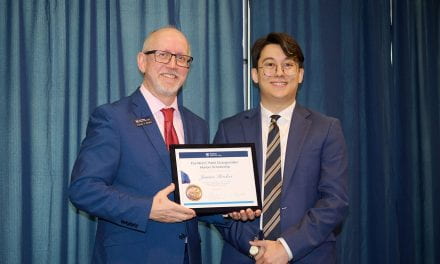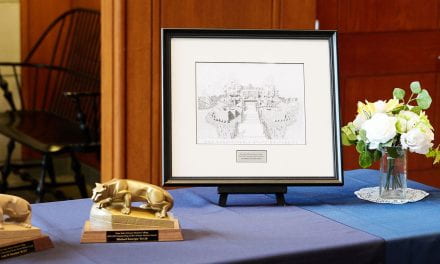Cheryl Achterberg arrived at University Park from Ithaca, New York in 1985. She was working on completing her doctorate in human nutrition from Cornell when she accepted an offer to serve as the assistant director of the Penn State Nutrition Center. Achterberg was a highly sought young professional and she chose Penn State because it aligned so well with her long-term vision for her career.
“I took [my first job here] because I thought I could accomplish more of what I wanted to do at Penn State than I could at any of the other institutions that gave me an offer. That proved to be true,” Achterberg said. “Tremendous flexibility was given to me in my roles from assistant professor to full professor and, eventually, to starting up the Honors College.
“That means everything to me because higher education, as a profession, is often very programmed,” Achterberg added. “Penn State gave me a chance to spread my wings and try new things. I was able to travel the world, and both intellectually and emotionally stretch myself.”
Achterberg “stretched” herself at Penn State for just over 20 years before moving on to other posts in academia. Her work in that time, including as the inaugural dean of Schreyer Honors College, set such high standards that she was awarded the title of Honorary Alumna this past May.
The award ceremony brought Achterberg back to State College and University Park for the first time since a 2021 memorial service for her late husband – John Brighton, former Penn State executive vice president and provost. She said the trip reconnected her with people she hadn’t seen in decades which led to “sharing lots of laughter and stories from my time there.” The ceremony and the visit, she said, left Achterberg feeling “overwhelmed” and “touched” and that she’d take lifelong memories with her back to Colorado, where she has lived since retiring from higher education in 2018.
The Honorary Alumni Award was established by the Alumni Association in 1973. It is given annually to people whose work has “made significant contributions toward the University’s welfare, reputation or prestige” though they are not Penn State graduates. In receiving the award this year, Achterberg joined Joan Schreyer ’91 as leading women of the Honors College to earn Honorary Alumna status.
“She was the consummate distinguished, genuine and generous woman. She was very clear-eyed and self-contained… knew what she liked and what she wanted. She was always reassuring and supportive of me and I have nothing but warm feelings for her,” Achterberg said in recalling her and Joan Schreyer’s relationship.
When Joan and her husband, Bill Schreyer, made the historic gift that established the eponymous honors college, it needed a leader whose vision could ensure Scholars were positioned to succeed as the College transitioned from its predecessor, the University Scholars Program. The desire for academic freedom that made Penn State such an attractive place for Achterberg to work in 1985, also played a large role in how she helped shape the Schreyer Honors College experience in 1997.


“Dean Achterberg displayed the rare combination of grace, passion and thoughtfulness as college leader,” said Ryan Newman, a Scholar alumnus who graduated in 2001 under Achterberg’s tenure as Dean. “She represented all that the College was at inception but more importantly she also represented all that Honors could become if we believed in the vision set out by the Schreyer family of shaping leaders who will shape tomorrow.”
Achterberg knew that Scholars needed rigorous coursework and robust opportunities outside of the classroom that would allow them to follow their curiosity, explore the intersections of their various interests and challenge themselves. Also, to get the most out of their experience, Achterberg knew that Scholars would need the support of a fully staffed college and of a close-knit community.
She took on initiatives in those formative years that are still impacting Schreyer nearly three decades later. Achterberg established Atherton Hall as the College’s physical home, developed the team that became the Scholar Ambassadors, advocated for Schreyer’s own director of development and led the effort in creating the College’s mission pillars.
“After the 2000 renovation, which established Atherton Hall as the home for the Honors College, I got a call from Dean Achterberg requesting that I give the official tour to Mr. and Mrs. Schreyer,” said Newman, who was one of the College’s inaugural Scholar Ambassadors. “The Dean’s vision of a living-working environment was on full display, and you could see the Schreyers’ delight as Dean Achterberg’s vision had come to life.
“As just one of many leaders who was shaped by Dean Achterberg, I will spend the rest of my career and efforts working to pay it forward in light of all that she has done for me personally, as well as for the Schreyer Honors College more broadly,” said Newman.
Achterberg moved on from Schreyer in 2005 to pursue other professional opportunities, and in that time the Honors College has undergone numerous evolutions both in leadership and in the needs of its Scholars. The foundation she helped build, along with the vision and hard work from the deans who followed, has kept the College among the national leaders in honors education. Though she is not a part of Schreyer’s day-to-day operations, Achterberg still thinks often about her former professional “home” and sees a bright future for the College.
“You can hope when you’re setting up bedrock for a new enterprise or institution that those foundational pieces will have lasting merit over time,” Achterberg said when reflecting on some of her earliest work at Schreyer. “Of course, there has been a lot of evolution and necessary change [within the College]. But it warms my heart to see some of those initial ideas still at play.”
“[In Schreyer’s] first few years, we really pursued service learning. I mean that not in the sense of painting a fence for a nonprofit, but an integration of academic learning, evaluation and critical thinking centered around working in the community,” she added. “After the work is finished, you re-evaluate what happened and work to discover if it was meaningful, what can be learned and what can be done better in the future.
“Young people now are facing existential issues like climate change and war, but I think through the vehicle of service learning that I described, they can feel empowered by knowing there is a role for them to contribute to making a positive difference in the world.”
Since retiring six years ago, Achterberg fulfilled a decades-long goal of moving to Colorado where she spends as much time in nature as possible, whether by hiking or on her electric bicycle. She is also enjoying the challenge of shifting from scientific to creative writing and is nearly finished with her memoir. It’s a drastic change of pace compared to the way Achterberg balanced life and work at Penn State and beyond. The time away from academia helped her learn a valuable lesson she hopes current Scholars can take to heart.
“Typically, we want to do too much too fast, and I think we need to learn to pace ourselves,” Achterberg said. “You have to laugh at me saying that because my personal physicians would ring their hands at me saying, ‘You’re burning the candle at both ends. You can’t keep doing this.’
“I worked so hard for decades. It did have a way of catching up with me and it has taken me a long time to recover. I’m very healthy now, and moving forward, but I paid a price,” she added. “So a lesson to leave others is to not try to do it all, to pace yourself and to trust that life will give you the runway to get where you want to go.”




